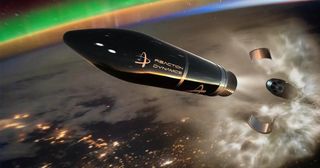Nova Scotia spaceport project aims to launch clean-tech rockets
Spaceport America and other private space launch facilities worldwide have a new entrant to the market: Canada, which aims to fly 'green' rockets in 2023.

Spaceport America is getting a Canadian competitor.
A private Canadian rocket facility aims to send clean-tech rocket missions to space as soon as 2023, adding more competition for Spaceport America. (The New Mexico-based private facility is famed for sending Virgin Galactic tourists to space, as well as launching research experiments.)
Construction on Canada's Spaceport Nova Scotia, near the Atlantic Ocean, was approved Monday (Aug. 29) at a moment when the private space industry is rapidly building up spaceports around the world.
Related: Spaceport construction set to begin on UK's northernmost island
Canada's new facility — managed by Maritime Launch Services — joins private rocket facilities in Cornwall (U.K.), Scotland, Australia and New Zealand, all looking to cash in on a rapidly growing industry. Launches worldwide had a $9.25 billion value in 2020, up 14% from the year before, according to a 2021 Space Foundation report.
Today's rockets can send small satellites to space by the dozen, and companies like SpaceX, Firefly Aerospace, Relativity Space and Rocket Lab are some of the main players vying to bring cubesats, nanosats and scientific experiments into space.
Related: SpaceX's Starlink megaconstellation launches in photos
Get the Space.com Newsletter
Breaking space news, the latest updates on rocket launches, skywatching events and more!
How much of a slice Nova Scotia will take out of the commercial spaceport market remains to be seen, however. Maritime Launch says they are banking on space companies worldwide that will "choose to establish a corporate presence" near the remote town of Canso, alongside the Atlantic Ocean.
Canso is 3.5 hours' drive from Halifax when it isn't slippery or snowing, which would be the case for half the year at least. That said, Halifax's municipal population of less than 500,000 is roughly equivalent to space hubs in Albuquerque (within driving distance of New Mexico's Spaceport America), Colorado Springs, and Cornwall.
It's also not clear how viable the spaceport business is more generally, as some of these facilities remain essentially startup zones even many years into their operation, particularly in the case of Spaceport America.
Spaceport America's anchor customer, Virgin Galactic, has been offline for 13 months due to SpaceShipTwo spacecraft and carrier upgrades. Suborbital flights of space tourists may begin by spring 2023 if the company's plans come to fruition, however.
Maritime Launch's early ambitions reach only as high as suborbital space. Its debut mission in 2023 will be using a small launcher from a Quebec startup, Reaction Dynamics.
The companies signed a letter of intent earlier this year to send more small rockets aloft, if the first launch goes to plan. The collaborators may upgrade the rockets to medium-class when Reaction Dynamics is ready to move forward on a business plan to launch satellite megaconstellations to orbit.
Reaction Dynamics, though untested in spaceflight, is trying to stand apart from the competition with clean-technology rockets, using a liquid oxidizer and a polymer-based solid fuel. Its rocket engine is partway through testing, according to its website.
The company says it has made a performance breakthrough in hybrid rocket engines, which use a combination of solid and liquid propellant to boost payloads aloft.
Reaction Dynamics' version, officials say, creates 60% less carbon dioxide (a greenhouse gas) than the competition. The company may also use recycled plastic in the fuel, a spokesperson told Montreal's Polytechnique college in 2021.
Follow Elizabeth Howell on Twitter @howellspace. Follow us on Twitter @Spacedotcom or on Facebook.
Join our Space Forums to keep talking space on the latest missions, night sky and more! And if you have a news tip, correction or comment, let us know at: community@space.com.

Elizabeth Howell (she/her), Ph.D., is a staff writer in the spaceflight channel since 2022 covering diversity, education and gaming as well. She was contributing writer for Space.com for 10 years before joining full-time. Elizabeth's reporting includes multiple exclusives with the White House and Office of the Vice-President of the United States, an exclusive conversation with aspiring space tourist (and NSYNC bassist) Lance Bass, speaking several times with the International Space Station, witnessing five human spaceflight launches on two continents, flying parabolic, working inside a spacesuit, and participating in a simulated Mars mission. Her latest book, "Why Am I Taller?", is co-written with astronaut Dave Williams. Elizabeth holds a Ph.D. and M.Sc. in Space Studies from the University of North Dakota, a Bachelor of Journalism from Canada's Carleton University and a Bachelor of History from Canada's Athabasca University. Elizabeth is also a post-secondary instructor in communications and science at several institutions since 2015; her experience includes developing and teaching an astronomy course at Canada's Algonquin College (with Indigenous content as well) to more than 1,000 students since 2020. Elizabeth first got interested in space after watching the movie Apollo 13 in 1996, and still wants to be an astronaut someday. Mastodon: https://qoto.org/@howellspace
